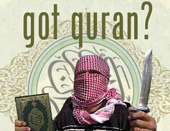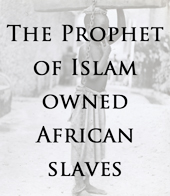Notes
In Islam, loyalty is to Allah and his religion. It cannot be to a kafir
country. As the former mufti of the Grand Mosque in Mecca put it in a
recent fatwa, "His homeland may not be Islamic, so how can he be loyal to his
homeland?"
Scholar Jamal Badawi (a favorite of CAIR) insists that, "Muslims should not melt in any pot
except the Muslim brotherhood pot."
Recap Erdogan, the Turkish leader who began his country's transition
from secularism to Islamism in thuggish fashion
said, "You cannot be both secular and a Muslim! You will either be a Muslim, or
secular. And why is that? Because Allah, the creator of the Muslim, has absolute
power and rule."
Interestingly, critics of Islam are raked over the coals for pointing out what Islamic scholars teach openly. In 2018, an Istanbul university lecturer stated that
"Islam and the concept of the Ummah is a decentralizing force for the nation-state [because]
the Ummah transcends boundaries." (He went on to add that "Islamophobia" is
a product of secularism). A CAIR executive director (in the United States) recently
said,
"if we are practicing Muslims, we are above the law of the land."
The Calcutta Quran Petition says of Muslim communities that "even fresh
converts tend to become highly orthodox people and follow the sayings of [the
Quran] with a fanatical zeal with the result that whichever country as their
sizable number amongst its population can never have peace on its soil."
Where Muslim minorities exist, there is unusual social strain manifested by
dissention, demand and disloyalty - as well as a cohesive group identity that
resists self-reflection and thrives on the perception of victimization by the
majority. This is related to Islamic tenets. Islam teaches that nations are in one of two major categories - Dar-al Harb
(house of war) and Dar-al-Islam (Muslim rule). Any nation that is not
Muslim is therefore, by definition, at war with Islam (or, at best, in
contradiction to the preferred order). Muslims cannot be
expected to maintain loyalty to a nation that is at war with their religion. One of the most influential Islamic scholars of the modern age, Egyptian Sayyid Qutb:
The fatherland is that place where the Islamic faith, the Islamic way of life and the Shari'ah of
God is dominant; only this meaning of 'fatherland' is worth of the human being. There is
only one place on earth which can be called the home of Islam (Dar-ul-Islam), and it is that
place where the Islamic state is established and the Shari'ah is the authority and God's limits are
observed, and where all the Muslims administer the affairs of the state with mutual consultation. The rest
of the world is the home of hostility (Dar-ul-Harb). A Muslim can have only two possible relations with
Dar-ul-Harb: peace with a contractual agreement, or war. A country with which there is a treaty will not
be considered the home of Islam
(source)
To be fair, some Muslim scholars also contend that there is a middle ground, Dar al-Ahd (land
of covenant) or Dar al-Sulh (land of truce), in which non-Muslim countries agree
to allow Muslims to practice their faith and evangelize freely in exchange for
peace (rights that are formally denied to infidels in Islamic lands).
Scholars consider this a transitional period leading to the eventual triumph of
Islam via conversion.
The practical definitions of Dar al-Ahd and Dar al-Sulh are somewhat
nebulous. Some feel, for example, that denying Muslims their own system of law and Sharia
courts constitutes an interference with Islam. Others believe that these
states of condition only
applied in Muhammad's day. Still others feel that a truce has a ten
year-limit, and can be broken at any time by the Muslim party.
Another difficulty with these "middle ground" options is that there is no
central authority to declare which non-Muslim nations fall outside the category
of Dar al-Harb. Ultimately, true Muslims are citizens of the ummah
(Islamic community) and not of any country - and the ummah currently has no recognized
leader.
Even a government of Muslims is not necessarily a Muslim government.
Islam requires Islamic law, therefore theocracy is the only pure form of
government. In fact, this is what propels the vast majority of violence in
the Muslim world, which victimizes nominal Muslims more than any other group.
Although Muslim apologists sometimes claim that Islamic terrorists aren't
Muslim by virtue of the fact that they kill other Muslims, the Quran advocates
striving against both unbelievers and hypocrites, the latter of which are
Muslims who profess Islam, but do not support Islamic rule over the way of the
infidel as required (see
Muslim 20:4696).
'Hypocrites' include
any 'Muslim' government which does not uphold strict Sharia, as well as those that make
alliances with a non-Muslim country (thereby making covenants and truces quite
difficult to legitimize). This is the real reason terrorists
kill fellow Muslims, particularly local police, troops and officials who are in
the service of such governments.
Sayyid Qutb says that Muslims have a duty to overthrow any non-Islamic government
by violent means. He explains:
"Islam is not merely a belief, so that it is enough merely to preach it.
Islam, which is a way of life, takes practical steps to organize a movement for
freeing man. Other societies do not give it [Islam] any opportunity to
organize its followers according to its own method, and hence it is the duty of
Islam to annihilate all such systems, as they are obstacles in the way of
universal freedom. Only in this manner can the way of life be wholly
dedicated to Allah, so that neither any human authority nor the question of
servitude remains, as is the case in all other systems which are based on man's
servitude to man." [Quoted from Andrew Bostom's
The Legacy of Jihad]
Elsewhere, Qutb puts it more bluntly: The foremost duty of Islam in
this world is to depose Jahiliyyah (unbelievers) from the leadership of man, and
to take the leadership into its own hands and enforce the particular way of life
which is its permanent feature." [Quoted from Robert Spencer's
Religion of Peace?]
In a book promoted by the Islamic Circle of North America (ICNA), Islamic
scholar Sayyid Abul Ala Maududi writes that "Islam wishes to destroy all
States and Governments anywhere on the face of the earth which are opposed to
the ideology and programme of Islam regardless of the country or the Nation that
rules it. Islam requires the earth – not just a portion – but the whole
planet.” (source)
Whether or not a Muslim believes in active rebellion against secular or
non-Muslim rule (and most may not), it is does not change the fact that Islam is
defined by allegiance to Allah and his self-proclaimed messenger, Muhammad. Therefore any
extraneous loyalty that is in contradiction to what Allah has already
established would be strictly forbidden.
[It should be noted that Muslims as individuals vary widely in their
understanding of and allegiance to Islam. While ideological scrutiny may
be appropriate for certain sensitive positions in the intelligence, military or
law enforcement communities, simply being a Muslim is not
sufficient grounds for denying employment to or making assumptions about any
such individual, including their patriotism.]
See also:
Is Islam compatible with democracy? (TROP
article)
Respect for the national anthem
and flag (Muslim fatwa, since removed)
Muslim Fatwa
|





